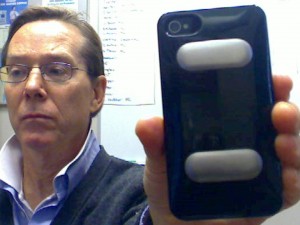
December 2010: Dr David Albert and the iPhoneECG case
As part of its ongoing mHealth feature, MIT Technology Review has a new article on obtaining a major achievement for iOS health device manufacturers: Getting Apple to carry a device at its brick-and-mortar retail stores.
Apple's retail locations already sell iPhone-compatible health and wellness devices, including the Withings Body Scale and the iHealth BP3 Blood Pressure Cuff. Connected medical devices for the iPhone first gained notice in early 2009 at an iPhone 3.0 launch event, when Apple demonstrated how a LifeScan blood glucose meter could connect to the iPhone. (LifeScan has been relatively quiet about mobile devices since but recently emerged as a partner to mobile health startup Cellnovo.)
Two years later, securing FDA clearance and also finding a spot inside Apple's retail locations is far from easy. TR polled companies that have managed to do so about the process.
Here, roughly, are the steps a company needs to follow: First check-in with the FDA and spend the time and money to get medical device clearance if need be. Apple isn't interested until this step is complete, according to TR. Next, device makers need to submit the app that corresponds with their peripheral device to Apple's AppStore. Next, device makers need to apply to be a part of Apple's "Made for iPhone" or MFI program and be ready for a good amount of feedback. A few tips for gaining approval: Keep a tight connection with the iPhone either through a case or cordless plug-in. Keep the peripheral device form factor small since shelf space is precious. Then, you submit your device and include as much info as you can muster along with some prototypes. The next step, according to TR, is to keep quiet about all this. Here are the last three steps according to TR:
Secret sauce: Now you're ready for the secret stuff. Developers who get this far will obtain the "iPod Accessory protocol," the secret technical specs needed to communicate with the iPod, iPhone, and iPad. Connect! The iPhone is famously locked down. Apple provides special hardware and other components needed to connect through Apple's 30-pin dock connector. Get approved: All that's left is final approval by Apple. Developers say that's harder than getting a green light from the FDA. Unlike the government, Apple can reject you without telling you why.
One company that is interested in a spot on Apple's store shelves is AliveCor, whose founder Dr. David Albert told TR that he has met with Apple executives about carrying his iPhoneECG device.
Read the Apple Store article over at Technology Review here and an article about AliveCor's iPhoneECG here.














